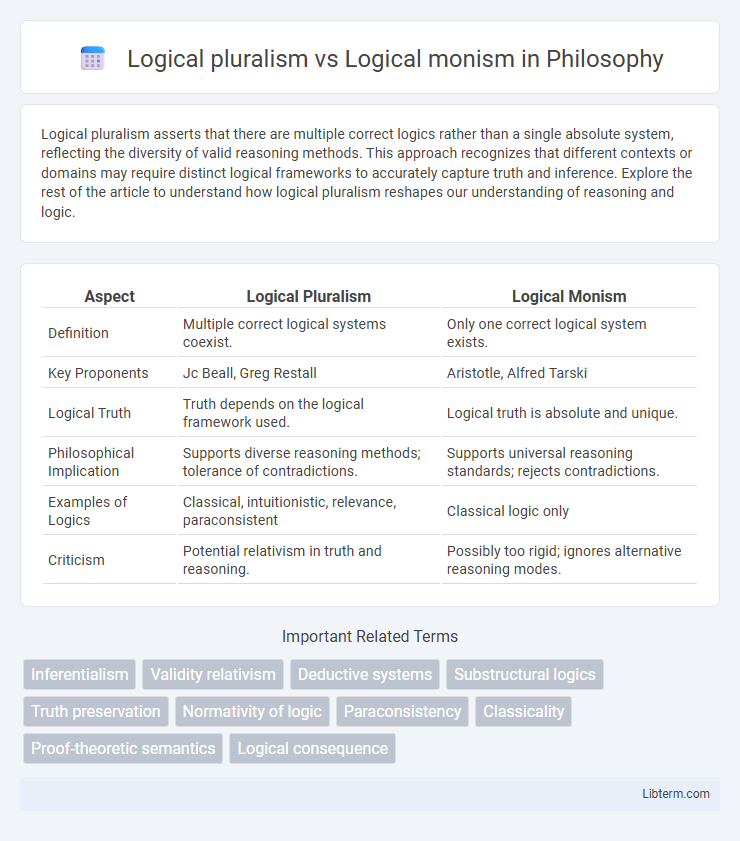Logical pluralism asserts that there are multiple correct logics rather than a single absolute system, reflecting the diversity of valid reasoning methods. This approach recognizes that different contexts or domains may require distinct logical frameworks to accurately capture truth and inference. Explore the rest of the article to understand how logical pluralism reshapes our understanding of reasoning and logic.
Table of Comparison
| Aspect | Logical Pluralism | Logical Monism |
|---|---|---|
| Definition | Multiple correct logical systems coexist. | Only one correct logical system exists. |
| Key Proponents | Jc Beall, Greg Restall | Aristotle, Alfred Tarski |
| Logical Truth | Truth depends on the logical framework used. | Logical truth is absolute and unique. |
| Philosophical Implication | Supports diverse reasoning methods; tolerance of contradictions. | Supports universal reasoning standards; rejects contradictions. |
| Examples of Logics | Classical, intuitionistic, relevance, paraconsistent | Classical logic only |
| Criticism | Potential relativism in truth and reasoning. | Possibly too rigid; ignores alternative reasoning modes. |
Introduction to Logical Pluralism and Monism
Logical pluralism asserts that multiple correct logics exist, each valid within different contexts or purposes, challenging the traditional view that there is a single, universal logic. Logical monism maintains that only one true logic governs valid reasoning, typically classical logic, providing a unified framework for all logical evaluation. This foundational debate shapes the understanding of logical consequence, entailment, and the nature of reasoning in philosophy and formal logic.
Defining Logical Pluralism
Logical pluralism asserts that there are multiple legitimate logical systems that can be used to evaluate reasoning, each valid under different conceptual schemes or contexts. It contrasts with logical monism, which maintains that a single, universal logic governs all valid inference. Defining logical pluralism emphasizes the coexistence of diverse logics such as classical, intuitionistic, or relevance logic, each capturing different aspects of rationality and truth.
Defining Logical Monism
Logical monism asserts that there is only one correct logic system governing valid reasoning, typically classical logic, which serves as the universal standard for all deductive processes. It contrasts with logical pluralism, which maintains that multiple, equally valid logics exist depending on context or purpose. Defining logical monism involves emphasizing its commitment to a single, fixed set of logical principles that uniquely determine the structure of valid inference.
Historical Development of Logical Theories
Logical pluralism emerged in the late 20th century as a response to the limitations of classical logic, emphasizing that multiple logical systems can validly represent different types of reasoning. In contrast, logical monism, rooted in ancient Aristotelian principles and later solidified by Frege and Russell, maintains that there is a single correct logic underlying all rational thought. The historical development of logical theories reflects a transition from strict monistic views to more pluralistic approaches, accommodating the diversity of contexts in mathematical, philosophical, and computational logic.
Core Arguments for Logical Pluralism
Logical pluralism asserts that multiple, equally valid logic systems can coexist, each correctly capturing different inferential patterns within various contexts or languages. Proponents argue that no single logic, such as classical logic, exhaustively accounts for all notions of consequence, emphasizing the diversity of reasoning practices found in mathematics, linguistics, and everyday discourse. Core arguments include the recognition of context-dependent validity, the inadequacy of a singular logical framework to explain all forms of inference, and the empirical observation that different logics provide valuable insights tailored to specific domains.
Core Arguments for Logical Monism
Logical monism asserts the existence of a single correct logic governing valid reasoning, based on the belief that logical truth is absolute and context-independent. Core arguments for logical monism emphasize the universality and objectivity of one logical system, often classical logic, as essential for consistent communication and rational inference. This perspective holds that adopting multiple logics leads to relativism and undermines the foundation of mathematical and philosophical rigor.
Key Philosophers and Their Contributions
Logical pluralism, championed by philosophers like Jc Beall and Greg Restall, asserts that multiple logics can be correct depending on different contexts or purposes, emphasizing the coexistence of classical, intuitionistic, and relevance logics. Logical monism, advocated by figures such as Gottlob Frege and Alfred Tarski, maintains that there is a single true logic, often classical logic, underlying all valid reasoning and mathematical foundations. Beall and Restall's work crucially challenges Tarski's semantic theory of truth, while Frege's formalization of logic laid the groundwork for monistic views.
Applications and Implications in Contemporary Logic
Logical pluralism, which accepts multiple legitimate logical systems, supports varied reasoning frameworks in artificial intelligence, computer science, and quantum computing, enabling more flexible problem-solving approaches. Logical monism, favoring a single true logic, simplifies formal verification, automated theorem proving, and classical algorithm design by providing a unified framework. Understanding these perspectives influences the development of logical tools and methodologies crucial for innovation in knowledge representation, reasoning under uncertainty, and computational linguistics.
Challenges and Criticisms of Each Position
Logical pluralism faces challenges in justifying the coexistence of multiple, equally valid logical systems without descending into relativism or losing normative force. Logical monism encounters criticism for its rigidity, often being accused of oversimplifying complex reasoning by adhering to a single system, which can neglect contextual or domain-specific variations in inference. Both positions wrestle with balancing theoretical robustness against practical applicability, making the debates central to contemporary philosophical logic.
Future Directions in the Debate: Pluralism vs Monism
Future directions in the debate between logical pluralism and logical monism emphasize exploring hybrid frameworks that integrate multiple logical systems while maintaining a core unifying logic. Advances in computational logic and artificial intelligence fuel interest in adaptable reasoning models, challenging strict monist perspectives. Ongoing research aims to clarify how pluralist approaches can coexist with or complement monist theories to better address diverse logical environments.
Logical pluralism Infographic

 libterm.com
libterm.com